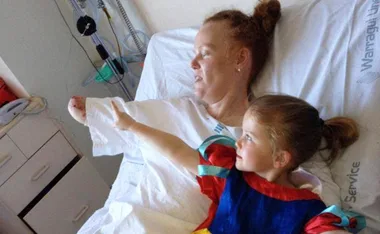49,000 Australian women are homeless on any given day with many couch surfing, sleeping in cars or tents, or staying with family and friends. Worse still, many women return to family violence because they have nowhere else to go. Join the campaign for safe homes for Australian women by signing our petition here.
For Judy Smith, it was the touch of a soft woollen jumper, enveloping her in a soothing hug as she shivered in shock from the traumatic loss of her home in the bushfires.
For Gemma Mannion, emerging from the darkness of domestic violence, slipping on a brand-new dress was the sliver of light she needed to feel she had a second chance at life.
For Lizzi Ward, it was the relief felt at receiving a pair of shoes for her rapidly growing son’s feet, knowing he could now happily run and play with his peers at day care.
And for Justine Lawson, it was the pampering she was receiving which – for a blessed moment – paused the crushing anxiety she lives with on a daily basis.
These four women could not be more different – their ages, circumstances and upbringings all as unique as the circumstances which brought them to the doors of Thread Together.
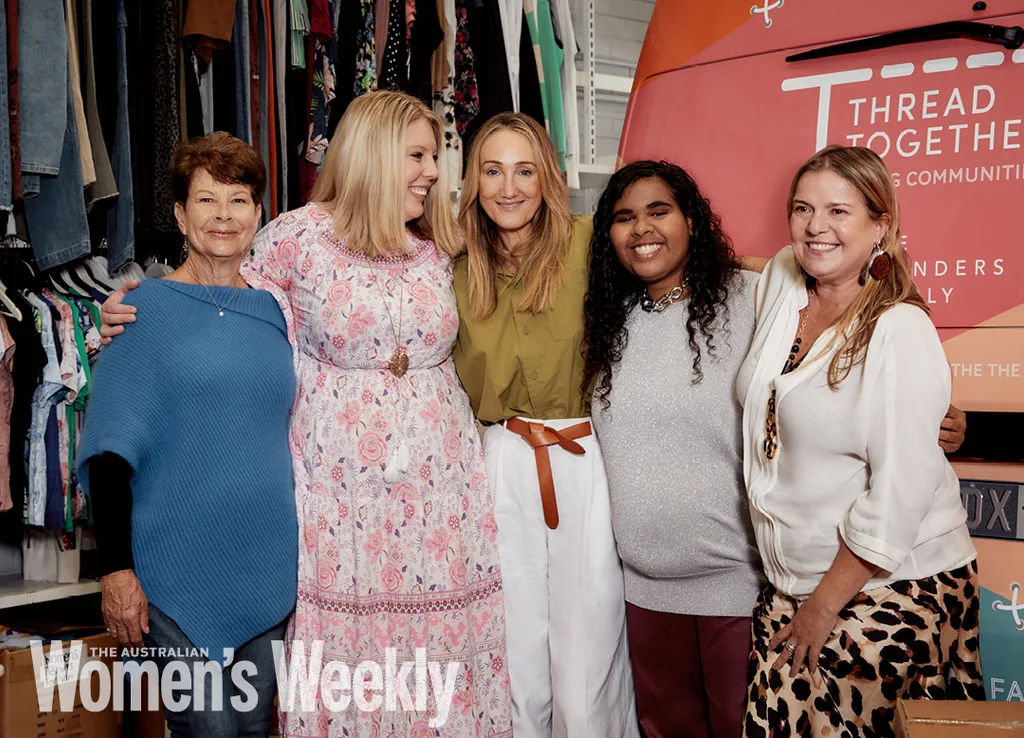
Thread Together has touched every one of these women’s lives
(Photo: Alana Landsberry)However, the gratitude and renewed confidence the charity has brought them is unifying.
“They really do change women’s lives and if it wasn’t for them, I honestly don’t believe I would be here today,” says Gemma, 28. “They gave me my confidence back. To know that I am me, I am an individual and I am loved and appreciated.”
“It hugely lifted me up,” Judy, 56, nods in agreement, while Justine, 53, concurs. “You come away feeling so special. It was lovely.”
“It’s important not just for mums like me, but the whole community,” adds Lizzi, 26. “They look after people in all kinds of different situations.”
“The people we meet and the services we work with are as varied as the clothes we have on offer,” says Andie Halas, CEO of Thread Together, the not-for-profit charity she founded 10 years ago. “There is no stereotype of what someone in need is like.”
A production error started the Thread Together journey.
Andie had ordered a batch of high-quality towels that were perfectly serviceable but had a small design defect. Rather than throw them away, she wandered down the road to her local charity shop hoping they could find a home.
“I noticed a mother and daughter rummaging through some old clothes – old bras, T-shirts – it was not dignified,” she recalls. “I thought, we can do better than that. So I called a few friends in the industry.”
Together, they gathered unsold end-of-season stock which, until that point, had been bound for the trash. They took it to the store and laid the clothing out on rails – with labels all still attached, sectioned into sizes and types and free for those in need.
“It was then that I realised how important it was for people to have choice,” she says of her ‘aha’ moment.
“To find the right size for themselves, for it to be practical, to find exactly what they want to wear and for it to be brand new. People shouldn’t have to be reminded of their set of circumstances by wearing someone else’s clothing.”
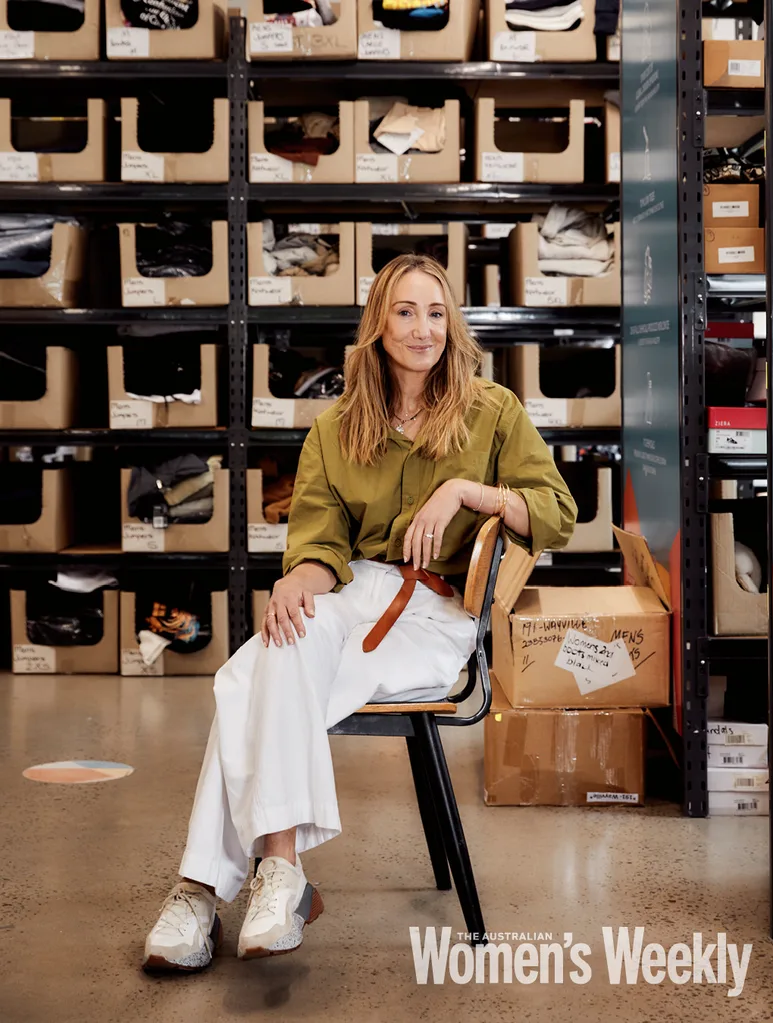
Thread Together founder – Andie Halas
(Photo: Alana Landsberry)And an equally urgent driving force for Andie was an environmental one.
Currently, textiles are the second largest contributor of waste. And, unlike food waste, green waste and more, they are the last cab off the rank when it comes to finding a management solution.
There’s a loose statistic in fashion that one-third of stock is sold at full price, one-third at sale markdowns and one-third ends up in landfill. In a world where we are more than ever aware of our fragile environment, that is a terrifying number.
And the reason for it is fashion’s wasteful business model, says Andie.
“You need to get [fabric and materials] at the right price, which means you have to order more to get the right price, which means you have excess at the end,” she explains. “There are companies with too much and there are people with too little, so let’s be the conduit and make sure it doesn’t go into landfill.”
“One of the first women we ended up helping was a victim of domestic violence,” Andie recalls of their early days in operation.
“We received an emergency call to help her and her five children because they’d run out with nothing. So we got them some pyjamas to wear that night, a fresh pair of underwear and tracksuits for the next day. I still speak to her regularly – she ended up putting herself through university, re-educating herself and now has a very senior position in a community centre. Support coming at a time people need it can help them make huge leaps.”
For Gemma, who today wears the dress she received when she was in that very same situation, this certainly rings true.
Her childhood had been incredibly traumatic. The eldest child of a drug-addicted mother, Gemma had been a victim of rape and physical cruelty. She had also raised her two younger siblings from the age of seven.
“High school was the hardest bit for me because I was trying to finish my QCE (Queensland Certificate of Education),” she says now. “I was taking my brother to school, looking after my mum, looking after the house. I grew up way too fast, I sacrificed a lot for my family.”
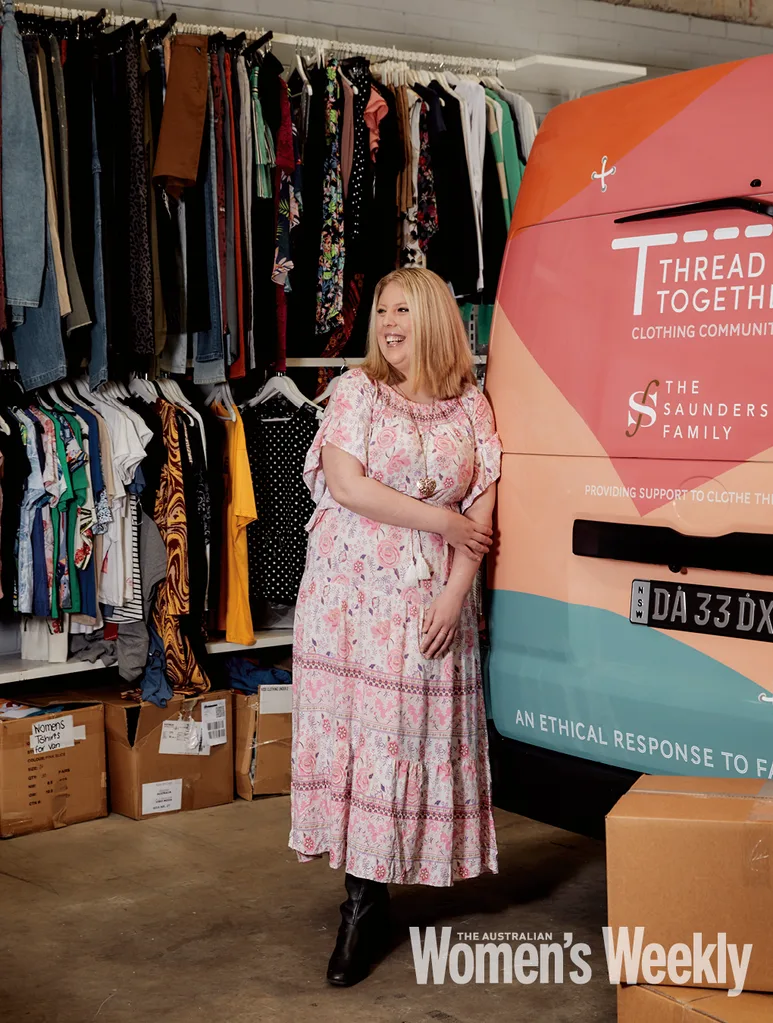
Gemma is just one of the women who has been helped by Thread Together
(Photo: Alana Landsberry)Shortly thereafter, she began dating a man who quickly became obsessive.
The pair lived together, albeit in separate rooms. And when she broke things off, that obsession became violent. Her ex would break into her room demanding sex, hitting her if she wouldn’t acquiesce. One night he refused to leave, falling asleep in her bed.
She was so terrified that she ended up going downstairs, where she tried to sleep on the floor of the women’s bathroom, just a dressing gown between her beaten body and the tiles.
“That’s when it hit me,” she says through tears. “You can’t live like this anymore. Either he’s going to kill you, or this is going to be the rest of your life.”
She arrived at a Dignity guest home – a service which gives haven to people experiencing homelessness – with just the clothes on her back. And they in turn alerted her to the local Thread Together hub – one of many which exist around the country in addition to their mobile vans.
“I went crazy, I got a whole bag of clothes,” she laughs. “It blew me away because they were like, ‘Go and pick whatever you want.’ It took me back because I didn’t believe in the generosity of people. I thought they were just all bad.”
Those clothes came in especially handy as Gemma was about to start a new job at a florist, work she says has given her purpose, stability and a sense of family.
“I didn’t have any work clothes and they knew my circumstances and just wanted to help me,” she says. “I will be forever grateful that they did.”
To start with, Andie relied on her own excess stock as well as that from like-minded fashion friends. Today, Thread Together has over 1000 fashion partners.
Brands from Bonds to Calvin Klein, R.M. Williams to Stuart Weitzman and many more work with the charity, which provides the means to clear their excess stock free of charge, solving what had previously been an expensive and wasteful process.
Toll Group has partnered free for their courier services and drop-offs. Goodman Group donated the warehouse space that is the revolving door for stock before it finds a grateful new home.
Afterpay has joined as a principal partner, helping by raising microdonations – asking consumers to add $1 to their purchase to go towards Thread Together. And all of this is helping them connect with other charitable organisations – currently 500 and counting – to ensure their services go far and wide.
“As long as they are a registered charity, we are happy to help,” says Andie of the only requirement Thread Together asks for before jumping into action.
“We work with homeless shelters, women’s shelters, youth at risk. We are completely non-judgemental. Gender transitioning [and] people leaving jail access the service to help them integrate back into the community. Refugees, people who have lost everything in fire or floods. We want these people to go on and be able to do good things with their lives.”
For Judy, this proved a life raft when the deadly 2019-2020 bushfires were raging through Australia.
It was Christmas and she and her son Benji had gone to stay with friends at Mogo on the NSW far South Coast when they found themselves battling the flames.
“But I never dreamed [our home was] in any danger because we only lived about 300 metres from the beach at Moruya,” she says now.
When the pair were eventually evacuated and attempted to make their way home, she found out she could not have been more wrong.
“The road that leads to our house was cordoned off and there were loads of police,” she says. “My other son was there, and he said, ‘Mum, I’m sorry, your house is gone.’ We lost everything.”
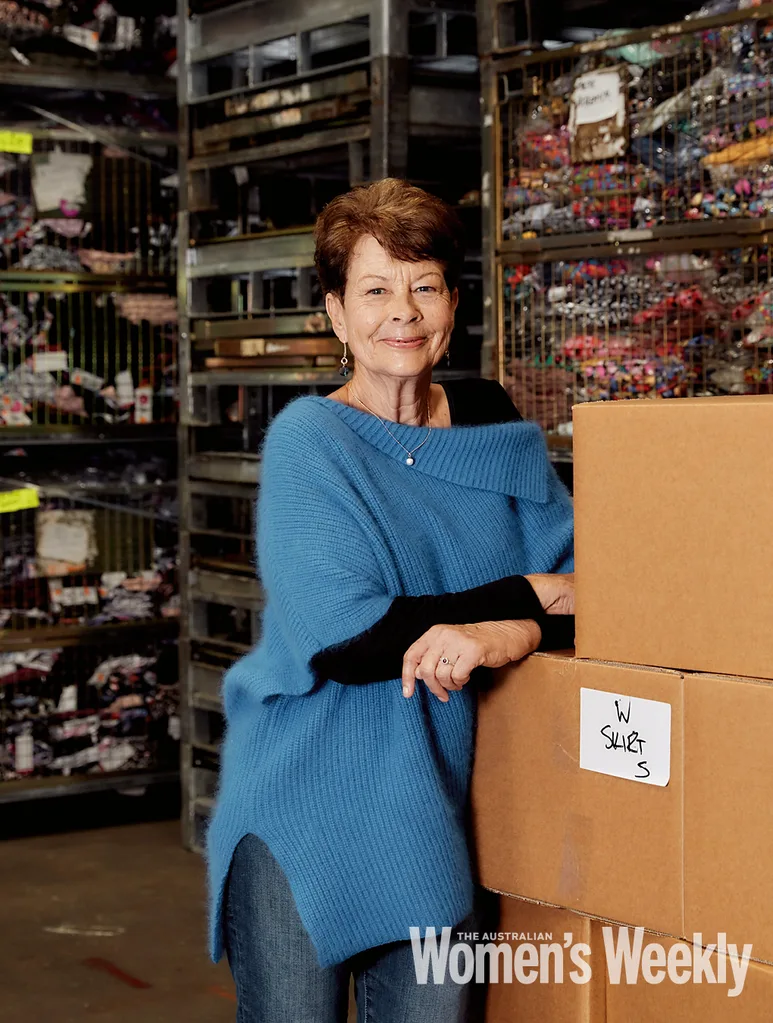
Judy lost everything in the 2019-2020 bushfires.
(Photo: Alana Landsberry)Arriving at an emergency shelter to wait out the worst, a shaken Judy was taken aside by an Anglicare volunteer.
“She told us that there was an organisation that had clothes we could get in Moruya, so we ended up there,” Judy recalls, stroking the beautiful blue Carla Zampatti jumper she was later gifted. “I’d never heard of Thread Together, but it was an amazing feeling when they said, ‘Help yourself to whatever you want.’
“Benji and I took a pair of jeans each and a top. They said, ‘No, keep going, take what you need!’ Then they were suggesting things – they had underwear and jumpers, T-shirts and jeans and jackets, all sorts of things and it was just this great sense of relief. To go from having nothing to having decent things to wear was amazing. And to be able to choose rather than be handed an old bag of clothes. I was standing in the shop shivering – I don’t know if it was that cold or if it was the shock – and they brought me out this jumper. I put it on and it was this feeling of, ‘Thank God’. It was very special.”
When new volunteers first arrive at the warehouse, Andie says, “they see the quality of the clothes we have and say, ‘wow’. They say, ‘I would wear this’. And I say, ”Well of course you would, that’s the whole point!’ Historically a lot of the clothing that we provide, people couldn’t afford to buy through op shops. There are so many people doing it tough. And that could happen to any of us at any time – and this is something that we can provide for them.”
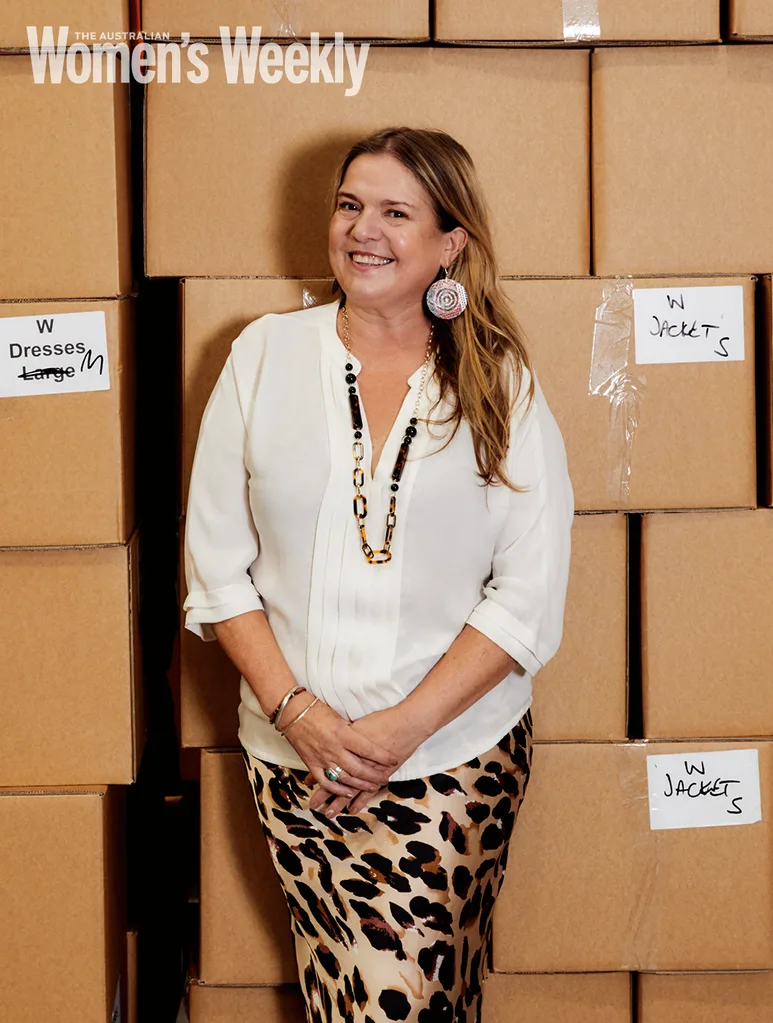
Justine first found Thread Together when her daughter needed new school shoes and jeans.
(Photo: Alana Landsberry)Thread Together also relies on the help of volunteers who ensure that those in need get a human connection and sense of belonging.
Lizzi and Justine each found that. Both are mums – Lizzi to a three-year-old (with another little boy on the way), Justine to a teenage girl – and both women have struggled with mental health issues that have affected their ability to work and study. Thread Together has helped.
“When I first got involved with them through my mother’s group, it boosted my confidence,” Lizzi explains. “They styled us and made sure we felt comfortable in the outfits they picked. It’s helped me find work and do my studies – because I’m studying design and fundamentals, an art course through TAFE. I do Aboriginal art which helps keep me connected to my culture.”
Justine first found the service when her daughter needed new school shoes and jeans. She was then reintroduced via not-for-profit company Two Good.
“It gets women who have been unemployed for many years, who have been homeless or through domestic violence,” she recalls. “They put you in a kitchen where you learn cooking skills and make food for women’s shelters, all kinds of things. I had graduated and they invited me for lunch. Two of the guys who work there said, ‘Have you heard of Thread Together? They are doing a pampering session.’ So they emailed me the details and I went down with a friend who was also doing the Two Good program. They had hair and make-up and you came away with an outfit. It was really special.”
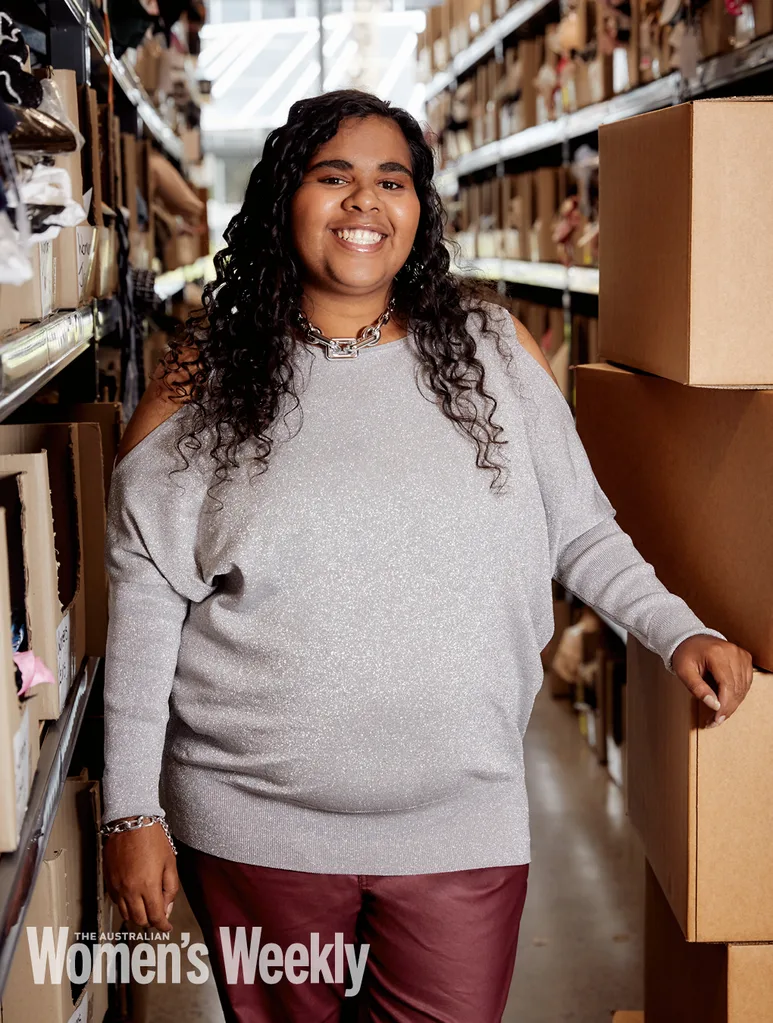
“When I first got involved, it boosted my confidence.” Lizzi on volunteering with Thread Together.
(Photo: Alana Landsberry)Today, Justine has found long-term housing.
And while she still has struggles, she is more confident about the future. Part of that confidence comes from being offered real solutions, rather than a bandaid to patch her problems – and that is what Thread Together aims to be.
“For some it’s an absolute necessity. Like, ‘I do not have a warm jumper. I live on the street and I need a pair of shoes’,” Andie explains. “But for other people it’s an act of kindness and a feeling of ‘I am not on my own’. The clothes represent something different for everyone.”
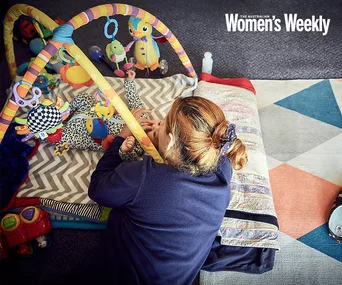
.jpg?resize=380%2C285)
